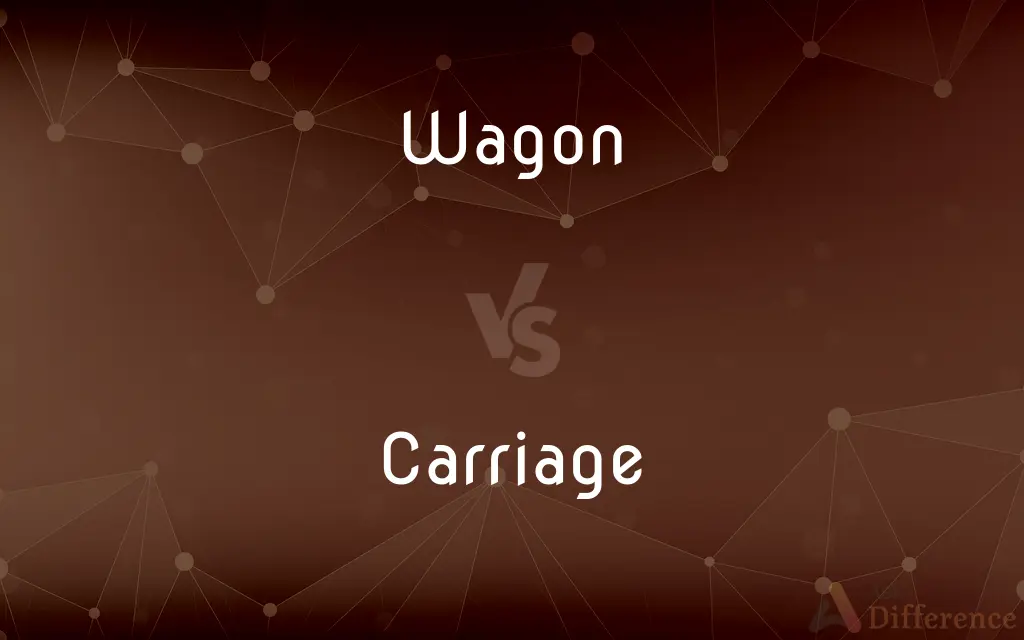Wagon vs. Carriage — What's the Difference?
By Urooj Arif & Maham Liaqat — Updated on April 19, 2024
Wagon is a four-wheeled vehicle typically used for transporting goods, while a carriage is designed primarily for carrying people.

Difference Between Wagon and Carriage
Table of Contents
ADVERTISEMENT
Key Differences
A wagon is a utilitarian vehicle with a flat platform or enclosed area for transporting goods or materials, often pulled by animals or vehicles. On the other hand, a carriage is specifically designed for passenger transport, usually featuring enclosed seating and more decorative elements.
Historically, wagons have been essential for agricultural and industrial tasks, utilized for hauling heavy loads. Whereas carriages have been symbols of elegance and status, often associated with wealth and ceremonial use.
The construction of a wagon is robust, intended to endure rough conditions and heavy loads. In contrast, carriages are built with comfort and aesthetics in mind, featuring suspension systems to smooth the ride.
Wagons are typically open to the air or have a simple tarp cover, making them less suitable for passenger comfort in harsh weather. Carriages, however, are usually enclosed and might have windows and doors, protecting passengers from the elements.
In modern usage, the term "wagon" can also refer to certain types of vehicles in automotive contexts, like station wagons, which are designed for both passenger and cargo transport. Carriages, however, have largely become historical or recreational vehicles, used in parks and tourist attractions.
ADVERTISEMENT
Comparison Chart
Primary Use
Transporting goods
Transporting people
Design
Robust, often open or simply covered
Elegant, usually enclosed and decorative
Historical Usage
Agricultural and industrial tasks
Symbols of wealth and ceremonial uses
Modern Equivalents
Station wagons in automotive
Recreational or tourist-oriented vehicles
Weather Protection
Minimal, with tarps for covering goods
Good, with enclosed spaces and windows
Compare with Definitions
Wagon
A child's vehicle, typically on four wheels, often pulled by hand.
The child pulled his toy wagon down the sidewalk.
Carriage
Part of a machine that moves and carries other parts.
The carriage of the typewriter moves as you type.
Wagon
Metaphorically, to cease addictive or undesirable behavior — colloquially 'on the wagon'.
He's been on the wagon for ten years now.
Carriage
A baby carriage, a wheeled vehicle for babies.
She pushed the baby carriage through the park.
Wagon
A small wheeled cart for carrying small loads.
She used a wagon to carry her gardening tools.
Carriage
A wheeled vehicle for transporting people, often horse-drawn.
The bridal couple rode in a horse-drawn carriage.
Wagon
In American English, a station wagon, a car with a long body and ample cargo space.
They packed their station wagon for the road trip.
Carriage
An element of posture or bearing.
Her carriage was upright and confident.
Wagon
A heavy four-wheeled vehicle for hauling.
The farmer loaded hay onto the wagon.
Carriage
In train terminology, a passenger vehicle.
We boarded the train carriage packed with commuters.
Wagon
A wagon or waggon is a heavy four-wheeled vehicle pulled by draught animals or on occasion by humans, used for transporting goods, commodities, agricultural materials, supplies and sometimes people. Wagons are immediately distinguished from carts (which have two wheels) and from lighter four-wheeled vehicles primarily for carrying people, such as carriages.
Carriage
A carriage is a private four-wheeled vehicle for people and is most commonly horse-drawn. Second-hand private carriages were common public transport, the equivalent of modern cars used as taxis.
Wagon
A vehicle used for transporting goods or another specified purpose
A breakdown wagon
A timber wagon
Carriage
A wheeled vehicle, especially a four-wheeled horse-drawn passenger vehicle, often of an elegant design.
Wagon
An unpleasant or disliked woman.
Carriage
Chiefly British A railroad passenger car.
Wagon
A four-wheeled, usually horse-drawn vehicle with a large rectangular body, used for transporting loads.
Carriage
A baby carriage.
Wagon
A light automotive transport or delivery vehicle.
Carriage
A wheeled support or frame for carrying a heavy object, such as a cannon.
Wagon
A station wagon.
Carriage
A moving part of a machine for holding or shifting another part
The carriage of a typewriter.
Wagon
A police patrol wagon.
Carriage
The act or process of transporting or carrying.
Wagon
A child's low, four-wheeled cart hauled by a long handle that governs the direction of the front wheels.
Carriage
(kărē-ĭj) The cost of or the charge for transporting.
Wagon
A small table or tray on wheels used for serving drinks or food
A dessert wagon.
Carriage
The manner of holding and moving one's head and body; bearing.
Wagon
Wagon The Big Dipper
Carriage
(Archaic) Management; administration.
Wagon
Chiefly British An open railway freight car.
Carriage
The act of conveying; carrying.
Wagon
To transport or undergo transportation by wagon.
Carriage
Means of conveyance.
Wagon
A heavier four-wheeled (normally horse-drawn) vehicle designed to carry goods (or sometimes people).
Carriage
A (mostly four-wheeled) lighter vehicle chiefly designed to transport people, generally drawn by horse power.
The carriage ride was very romantic.
Wagon
Abbreviation of toy wagon; A child's riding toy, with the same structure as a wagon (sense 1), pulled or steered by a long handle attached to the front.
Carriage
A railroad car
Wagon
(rail) A vehicle (wagon) designed to transport goods or people on railway.
Carriage
The manner or posture in which one holds or positions a body part, such as one's arm or head.
The runner has a very low arm carriage.
Wagon
(slang) transporting]] prisoners
Carriage
A manner of walking and moving in general; how one carries oneself, bearing, gait.
Wagon
; (by extension) a sport utility vehicle (SUV); any car.
Carriage
(archaic) One's behaviour, or way of conducting oneself towards others.
Wagon
A woman of loose morals, a promiscuous woman, a slapper; (by extension) a woman regarded as obnoxious; a bitch, a cow.
Thesaurus:promiscuous woman
Carriage
The part of a typewriter supporting the paper.
Wagon
(math) A kind of prefix used in de Bruijn notation.
Carriage
A shopping cart.
Wagon
(slang) Buttocks.
Carriage
(British) A stroller; a baby carriage.
Wagon
To load into a wagon in preparation for transportation; to transport by means of a wagon.
Carriage
The charge made for conveying (especially in the phrases carriage forward, when the charge is to be paid by the receiver, and carriage paid).
Wagon
To travel in a wagon.
Carriage
(archaic) That which is carried, baggage
Wagon
A wheeled carriage; a vehicle on four wheels, and usually drawn by horses; especially, one used for carrying freight or merchandise.
Carriage
That which is carried; burden; baggage.
David left his carriage in the hand of the keeper of the carriage.
And after those days we took up our carriages and went up to Jerusalem.
Wagon
A freight car on a railway.
Carriage
The act of carrying, transporting, or conveying.
Nine days employed in carriage.
Wagon
A chariot
Carriage
The price or expense of carrying.
Wagon
The Dipper, or Charles's Wain.
Carriage
That which carries of conveys,
Wagon
To transport in a wagon or wagons; as, goods are wagoned from city to city.
Carriage
The manner of carrying one's self; behavior; bearing; deportment; personal manners.
His gallant carriage all the rest did grace.
Wagon
To wagon goods as a business; as, the man wagons between Philadelphia and its suburbs.
Carriage
The act or manner of conducting measures or projects; management.
The passage and whole carriage of this action.
Wagon
Any of various kinds of wheeled vehicles drawn by a horse or tractor
Carriage
A railcar where passengers ride
Wagon
Van used by police to transport prisoners
Carriage
A vehicle with four wheels drawn by two or more horses
Wagon
A group of seven bright stars in the constellation Ursa Major
Carriage
Characteristic way of bearing one's body;
Stood with good posture
Wagon
A child's four-wheeled toy cart sometimes used for coasting
Carriage
A machine part that carries something else
Wagon
A car that has a long body and rear door with space behind rear seat
Carriage
A small vehicle with four wheels in which a baby or child is pushed around
Common Curiosities
What is a wagon used for?
Wagon is primarily used for transporting goods and materials.
What are the typical features of a wagon?
A wagon is robust, often open, and designed to carry heavy loads.
What is a carriage used for?
A carriage is designed for carrying people, often in comfort.
Can a wagon carry people?
While primarily for goods, large wagons can also transport people, especially in a rural or industrial setting.
What are the typical features of a carriage?
A carriage is typically enclosed, decorative, and built for passenger comfort.
How are wagons and carriages pulled?
Both can be pulled by animals like horses; wagons can also be vehicle-towed.
What symbolizes a carriage historically?
Historically, carriages symbolize wealth, status, and elegance.
Are carriages still used today?
Carriages are mostly used for recreation, tourism, or ceremonial purposes today.
What is the modern equivalent of a wagon in vehicles?
In modern terms, a "wagon" can refer to a station wagon in automotive contexts.
How do wagons handle weather?
Wagons usually have minimal weather protection, perhaps just a tarp.
Share Your Discovery

Previous Comparison
Parody vs. Burlesque
Next Comparison
Compost vs. ManureAuthor Spotlight
Written by
Urooj ArifUrooj is a skilled content writer at Ask Difference, known for her exceptional ability to simplify complex topics into engaging and informative content. With a passion for research and a flair for clear, concise writing, she consistently delivers articles that resonate with our diverse audience.
Co-written by
Maham Liaqat















































